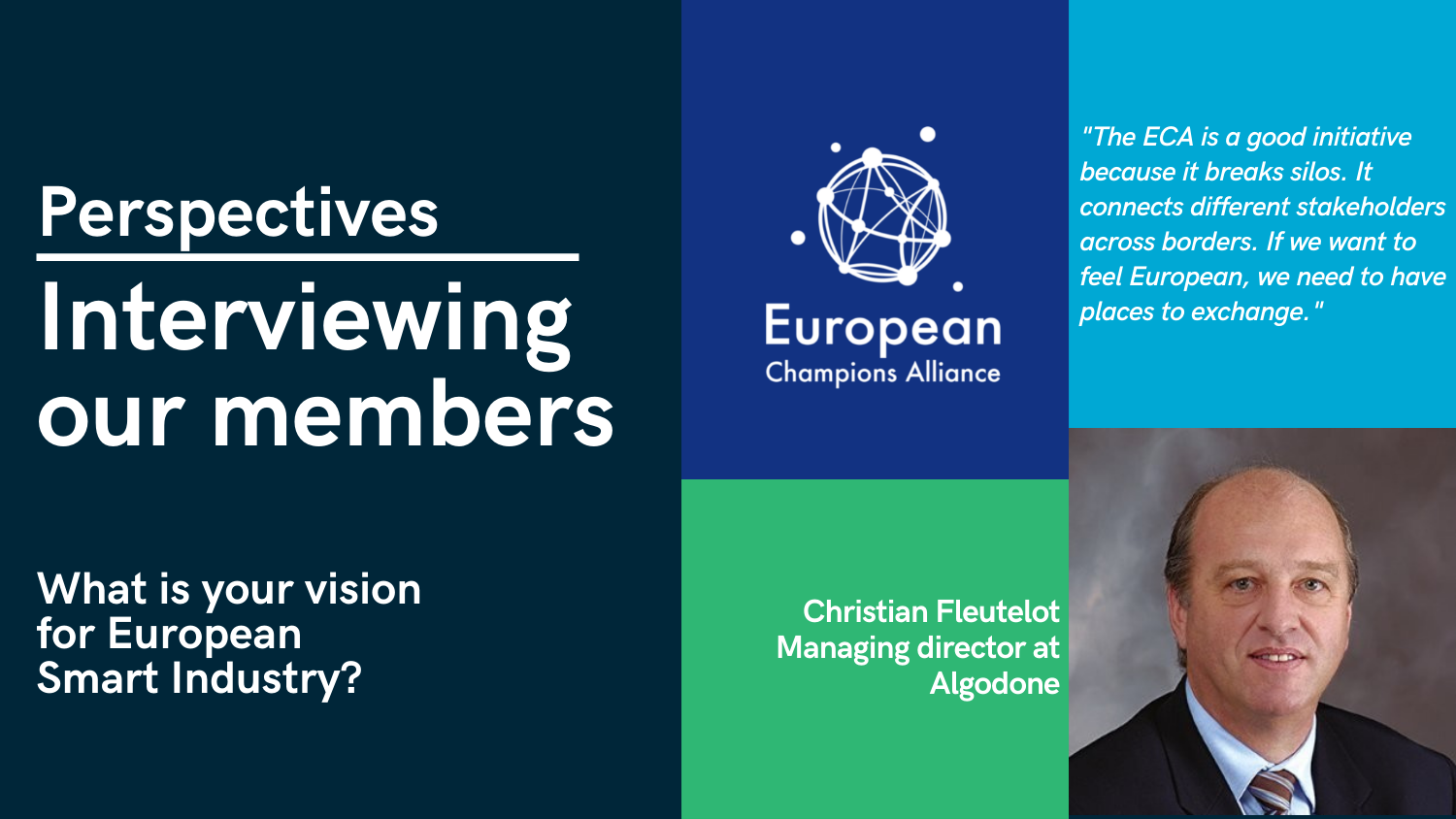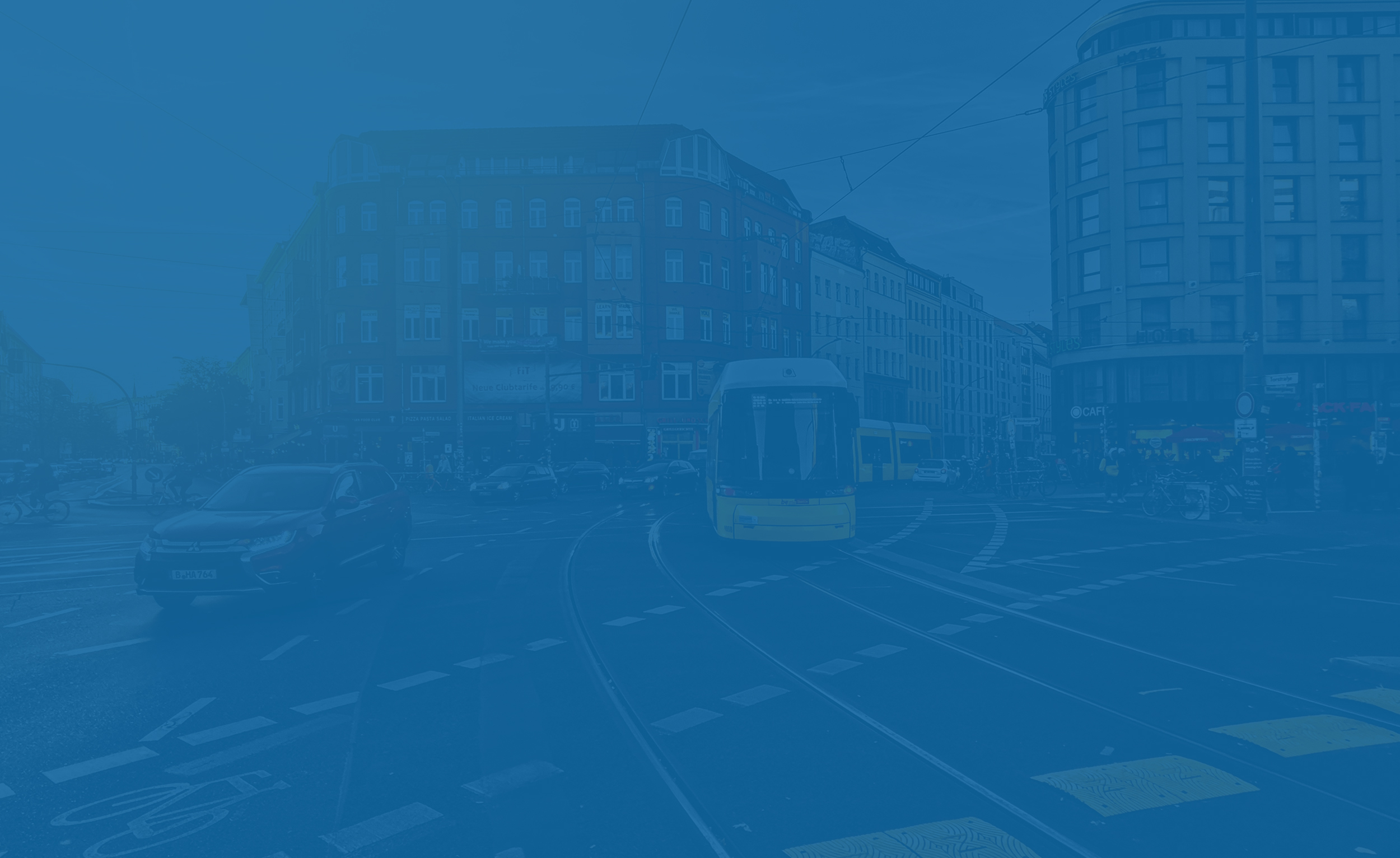
23 Aug Interview with Christian Fleutelot – Algodone
Interviewed by Mika Kübler
Why is it important that we think more European in the area of Smart Industry?
It’s a matter of competition. China and the US have a critical mass in terms of market size that allows them to develop products and amortize the costs on the local market. If we want to have the same potential locally, locally means Europe. Our individual markets are just too small to be able to compete with the largest single economies around the world. Furthermore, the large internet platforms collect data and store it somewhere where it is beyond our control, it’s a vulnerability.
Has Algodone already expanded into Europe? If yes, where? If not, why not? Is Algodone planning this step in the medium term?
No, not into Europe, but into the US. This is due to the main markets of our company. Currently, there are two markets. One of them is defense and security. In this market, we are 100% in France, due to historical reasons. And on the other market (monetization of hardware in pay-per-use mode) our main customer is in the US.
However, it’s not the same to expand to Europe than to the US. The barriers are different. In Europe I don’t see real barriers (except language, culture, etc..). It’s more a matter of the costs of travelling.
The European market is more fragmented which makes it difficult, since you need to adapt your marketing strategy to each country, but on the other hand, everything is in the same time zone and can mostly be accessed in a one day trip.
The US is a large territory by itself, with several time zones and 6 hours flights to go from north east to south west. As a start-up, you must set priorities and focus on them. You also need a network of commercial relays like representatives, distributors or VARs that will help you to cover. The questions that come when you decide to address the US market are “where do I open my first sales office” and “what partners do I need locally?”.
In the case of Algodone we will need representative and value added resellers. The role of VARs being to support customers when they integrate the Algodone solutions in their system, our VAR will have to be a kind of electronic design center.
Where do you need support in order to approach new customers internationally?
Albeit everyone speaking English nowadays, language can be the main issue, making things a bit more difficult and less direct. Culture as well in terms of behaviour, structure, working times, etc. . When it comes to the product, that’s not an issue, because it can be applied in the same way to a Spanish customer than to a Finnish customer.
Currently, Algodone focuses more on northern Europe, as well as the BENELUX and DACH states, because the electronic system industry is more developed.
In your opinion, how can companies in Smart Industry best internationalize? Which criteria have to be met? How do you want to be positioned? What goals do you have to set yourself?
It depends on the product. If you have a product available off the shelf, it’s much easier than for Algodone, which adjusts its solution to every customer and project. In our case, clear structures are crucial before going international. Algodone needs to be able to support opportunities in, e.g. Germany, right away. An issue however is the technical support. Located in Montpellier, the technical support, which needs to be at the client, travels long distances. So, before addressing the countries, we need to have people and structures in place that allow for technical support in that region. This is missing today. For us, it’s not only sales but the technical support who carries a project.
Can’t you grow European, like with your european customers and suppliers? Is this worth striving for? What difficulties do you see here? What is it lacking?
I think that the European market is large, homogeneous and independent enough from the rest of the world to be able to grow on a European scale!
Scared of being bought up from a group and innovation getting lost?
Algodone is not scared of the future. I don’t see big corporations as a threat. Of course, we do not want our service to get lost in some big corporations’ offerings. However, I don’t exclude getting taken over by a big group at some point in the future.
Can’t Algodone sell digital services after a partner of the ECA has acquired a new customer, as kind of an add-on? In that way you could support each other, at least the companies that are in the ECA.
In most of the military systems, our solution is used as a complement to another solution. Currently, Algodone is too small to take everything on its own. There are many providers of secure IoT management platforms, Algodone just provides additional functions and expands the security perimeter of those platforms. In fact, we focus on two kinds of companies (end users and companies that are developing electronic systems for those end users) . The developer of the electronic system will integrate the Algodone technology and the end user will use it.
Most large companies have structures in place to help start-ups work with them; they create links between the teams, make the start-up participate to advance R&D projects, but in the end you are not really in unless you are embedded in a commercial product . In any case, it is a long process. Here, the ECA could help to shorten this long process. The ECA’s role could be to spread visibility, start-ups need to be able to present what they are doing directly to product lines, business unit marketing. then some of the decision makers would be interested in what they are doing.
Why is the ECA a good initiative and why is it different from other organizations?
The ECA is a good initiative because it breaks silos. It connects different stakeholders across borders. If we want to feel European, we need to have places to exchange. Not a lot of structures do this job. The good thing about the ECA is also its European orientation.
What trends do you see in the Smart Industry for the near future? 5 years? ten years?
The IoT will develop a lot. Billions of objects will be connected through the internet. New security challenges will appear, attacks will be sometimes identical to the attacks on the WEB, sometimes not. What makes the objects in the network specific, is that they are objects, not servers, databases, files … and therefore they can be attacked physically. No doubt that hackers will take this into account to invent new strategies or approaches to attack the networks. This needs to be anticipated, we should not wait for the problems to occur to start considering the security of the IoT seriously. Algodone’s solutions are really focusing on tackling this problems of physical attacks.
In which areas do you see Europe on the advance versus? Competitors from Asia and the USA? Where is Europe lagging behind?
In their industry, it is difficult for me to say. In the last 20 years I have seen Europe ahead of the others in smart cars, banking security and so on. Each and every time we lost our leadership position. Sadly today, I don’t see areas where we are ahead of the others.
If you are interested in finding out more about Algodone visit the website or follow the social media.


